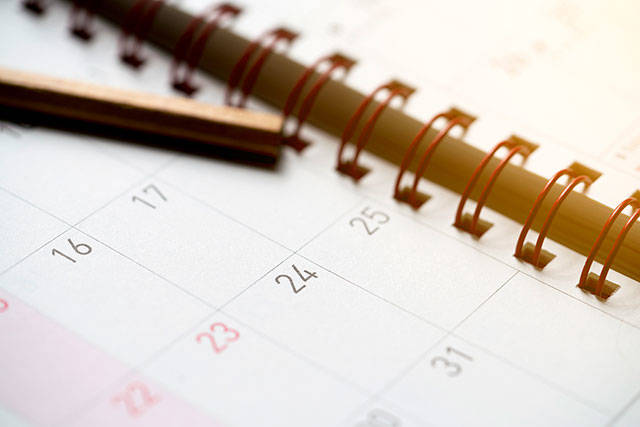It’s the war of planners with digital planners on one side and hard copy planners on the other side.
Often, people feel forced to choose a side without taking their own natural tendencies and work habits into consideration.
Paper people often feel compelled to embrace electronic planners due to pressure to conform to using the electronic gadgets that are ubiquitous.
Well, what are planners and calendars for anyway?
■ To schedule appointments.
■ To schedule meetings.
■ To keep track of personal and professional events and activities.
■ To remember birthdays and special occasions.
■ To schedule vacations.
■ To take notes.
What else do you use your planner for? Planners can be a major tool in helping you get organized and use your time wisely.
With the importance of using your planner daily, how do you choose which type to use? I like people to think about their natural tendencies and what feels comfortable to them.
Do you naturally gravitate toward paper and pencil so you have something in your hands to touch and so you can turn the pages? Or do you prefer to have the latest and greatest electronic gadgets and apps at your fingertips?
I want you to be able to embrace what you use because it’s easy for you to use and so you use it consistently.
This means using it every day, multiple times per day as well as checking it in the evening prior to the next day.
You will become best friends with your planner! OK, maybe just really good friends.
Let’s take a look at some of the benefits and features of paper and digital planners to help you with your decision making process if you’re thinking of making a switch or investing in a calendar system for your first time.
Paper Planner
I actually prefer a paper planner and a pencil because I like seeing my days laid out in front of me all at once. I like to be able to turn the pages to look ahead at the days, weeks and months ahead.
If you’re a tactile person you may gravitate toward a paper system for these reasons.
Recently, I worked with a client and had her take notes during our consultation. As it turns out, she greatly benefits from physically writing things down as it helps her remember details better. This is a great testament for using a paper planner to help us remember the details of our schedules.
I prefer large planners with ample room to write. I’ve found it frustrating in the past to use calendars with little squares to write in because it’s easy to run out of space or end up with appointment times that are out of order.
When I was using a paper planner (yes “was”as I did go digital), I loved the At-a-Glance Quick Notes Weekly/Monthly planners because each day is laid out from morning until night. There’s also a section on the side of the page to jot down notes which is handy.
If you’re using a paper planner, be sure to look for one with a sturdy cover as you’ll be toting that thing around for 365 days and you want it to hold up. And, don’t forget to use a pencil so you can easily make changes and updates with the swipe of an eraser.
Even if you’re a die-hard paper person, at some point you may come to a crossroads when a paper planner isn’t serving you as well as it once did. That time came for me a few years ago. It took some time to get used to, but I’m really happy that I switched to digital.
Digital Planner
As I said, I did make the switch to a digital calendar system. As much as I liked my paper planner, eventually it just wasn’t working well for me anymore and it was no longer an efficient system.
I was afraid I would leave my planner behind at a client’s home or office and, of course, I wasn’t able to make further appointments unless I had my planner with me. I think the biggest issue that pushed me toward digital was the fact that I had to hand write all recurring events and appointments.
Every month I had to write in all the weekly meetings I attend and every year I had to write in all of the birthdays that would be coming up each month. So, a very big benefit to digital calendars is the recurring appointment feature.
A great option with digital systems is being able to add a reminder to your tasks. A pop-up reminder on your screen, with or without a tone, can be a boost for time management. I always like to set a reminder 30 minutes prior to a meeting or an appointment so I know I’ll arrive at my destination on time.
A digital system can go with you wherever you go when you sync your calendar on your computer, phone and other devices. Whether you have a paper planner in your hand or a cell phone to track your schedule, be sure to consistently use it every day as an important time management tool.
Monika Kristofferson is a professional organizer and productivity consultant who owns Efficient Organization NW in LakeStevens. Reach her at 425-220-8905 or monika@efficientorganizationnw.com.
Talk to us
> Give us your news tips.
> Send us a letter to the editor.
> More Herald contact information.

























